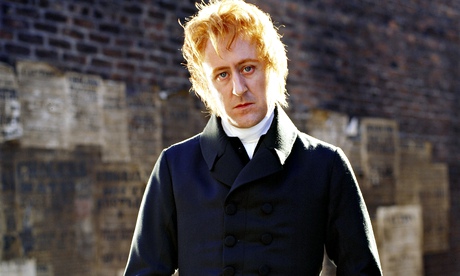
I saw a cadaverous face appear at a small window on the ground floor … and quickly disappear. The low arched door then opened, and the face came out. It was quite as cadaverous as it had looked in the window, though in the grain of it there was that tinge of red which is sometimes to be observed in the skins of red-haired people. It belonged to a red-haired person - a youth of 15, as I take it now, but looking much older – whose hair was cropped as close as the closest stubble; who had hardly any eyebrows, and no eyelashes, and eyes of a red-brown, so unsheltered and unshaded, that I remember wondering how he went to sleep. He was high-shouldered and bony; dressed in decent black, with a white wisp of a neckcloth; buttoned up to the throat; and had a long, lank, skeleton hand, which particularly attracted my attention …
So, in Charles Dickens’s David Copperfield, we get our first glimpse of one of the greatest villains ever to stalk the pages of a book. Immediately after this vivid description – and is if it wasn’t already obvious enough that this is a wrong ‘un – the great Betsy Trotwood sounds out his name: Uriah Heep.
I’ll say it again: Uriah Heep. It’s satisfying even to type it. Uriah Heep. I don’t know what it is. An Old Testament prophet gone sour? A pile of wee? Either way, it fits. It is the name of a man who will tell you he is the “umblest person going” while scheming to lord it over you. The name of a man you don’t want to touch. A man indeed, whose very touch will ruin your day – as David Copperfield learned to his expense:
“As I came back, I saw Uriah Heep shutting up the office; and feeling friendly towards everybody, went in and spoke to him, and at parting, gave him my hand.”
Bad move:
“But oh, what a clammy hand his was! as ghostly to the touch as to the sight! I rubbed mine afterwards, to warm it, AND TO RUB HIS OFF.”
Ugh.
Heep’s infamy is undoubted. He says one thing and means another. He takes employment and shelter in the house of Mr Wickfield, a good man, and he does everything he can to destroy him, to take over his business and to force his daughter into his bed. He is cloying, jerking and writhing. He is dishonest, cruel and, above all, greedy. He is a “monster in the garb of man”. He is morally repugnant even when he sleeps:
There I saw him, lying on his back, with his legs extending to I don’t know where, gurglings taking place in his throat, stoppages in his nose, and his mouth open like a post office … Afterwards I was attracted to him in very repulsion, and could not help wandering in and out every half hour or so, and taking another look at him.
I quote at such length, because it is so much fun. Dickens’s descriptions, his great floods of revulsion, are fantastic. The inimitable author is sometimes criticised for writing caricatures – but who cares when they are this good?
Except, of course, the caricature works because it rings true. Who hasn’t met someone with a little bit of Heep in him; someone a little bit of obsequious and umble and doing his best to do you down?
The other thing that makes Heep so fascinating is the complication behind the smarmy face. He isn’t as simple as he first appears. Dickens makes us loath him, but he also forces us to understand him. Just as Satan gets the best lines in Paradise Lost, Heep get some of the best moments in David Copperfield (or, to give it its full, delightful, title: The Personal History, Adventures, Experience and Observation of David Copperfield the Younger of Blunderstone Rookery [Which He Never Meant to Publish on Any Account]). And like Satan, you can’t help feeling that Heep might have a point:
When I was quite a young boy,” he tells David Copperfield, “I got to know what umbleness did, and I took to it. I ate umble pie with an appetite. I stopped at the umble point of my learning, and says I, ‘Hard hard!’ When you offered to teach me Latin, I knew better. ‘People like to be above you,’ says father, ‘keep yourself down.’ I am very umble to the present moment, Master Copperfield, but I’ve got a little power!
Dickens invites the troubling possibility that Heep is only attacking in self-defence. That the good characters have unconsciously done bad things. That the monster before them is partly of their own making, and partly formed by the systems they support:
They used to teach at school (the same school where I picked up so much umbleness), from nine o’clock to eleven, that labour was a curse; and from eleven o’clock to one, that it was a blessing and a cheerfulness, and a dignity, and I don’t know what all, eh?
Heep is an affront not just because he is evil, but because he’s society’s fault. Our fault. He is the part of us that enjoys flattery, that likes to hear the word “yes” loud and often, and doesn’t mind feeling superior to other people. He’s our guilty conscience as well as a criminal in his own right. Which is no doubt why we enjoy his eventual “pulverisation” so very much – and why he lingers so long in the mind. Why we never can quite rub off that clammy handshake …

